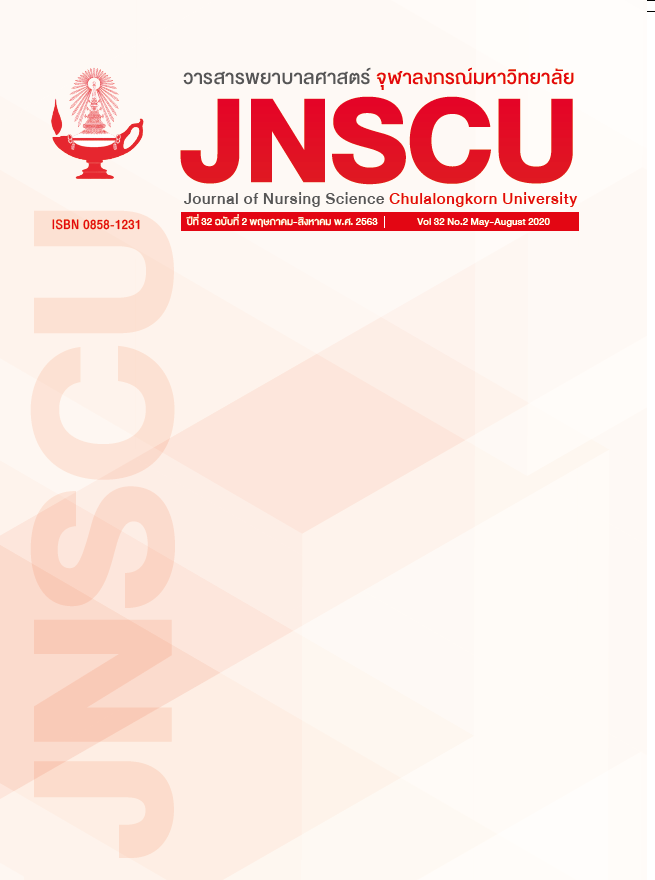ประสบการณ์ความรอบรู้ทางด้านสุขภาพจิตของผู้ที่มีอาการสงบจากโรคซึมเศร้า
คำสำคัญ:
ความรอบรู้ด้านสุขภาพจิต/อาการสงบ/ โรคซึมเศร้า, Mental health literacy / Remission/ Depressive disorderบทคัดย่อ
วัตถุประสงค์ : เพื่ออธิบายความหมายและศึกษาประสบการณ์ความรอบรู้ทางด้านสุขภาพจิตของผู้ที่มีอาการสงบจากโรคซึมเศร้า
รูปแบบการวิจัย: การวิจัยเชิงคุณภาพแบบปรากฎการณ์วิทยาของ Husserl
วิธีการดำเนินการวิจัย: ผู้ให้ข้อมูล คือ ผู้ป่วยที่ได้รับการวินิจฉัยว่าป่วยเป็นโรคซึมเศร้า ที่เข้ารับการรักษาตัวแบบผู้ป่วยนอก สถาบันจิตเวชศาสตร์สมเด็จเจ้าพระยา โดยใช้เกณฑ์การคัดเลือกกลุ่มตัวอย่างแบบเจาะจง (Purposive sampling ) จำนวน 10 ราย ทั้งเพศชายและหญิง ซึงมีคุณสมบัติตามเกณฑ์ และมีคะแนนภาวะซึมเศร้า (HRSD-17) ฉบับภาษาไทย อยู่ในระดับปกติ (0-7 คะแนน) โดยมีค่าสัมประสิทธิ์แอลฟาของครอนบาค เท่ากับ 0.738 ซึ่งนำมาเพื่อคัดกรองผู้ที่มีคุณสมบัติตามเกณฑ์เท่านั้น และเก็บรวบรวมข้อมูลโดยวิธีการสัมภาษณ์แบบเจาะลึก (In-depth Interview) แบบมีแนวทางการสัมภาษณ์ ร่วมกับการบันทึกเทป วิเคราะห์ข้อมูลตามวิธีของ Colaizzi
ผลการวิจัยสรุปได้ดังนี้ การศึกษาประสบการณ์ความรอบรู้ทางด้านสุขภาพจิตของผู้ป่วยโรคซึมเศร้าที่มีอาการสงบ ประกอบด้วย 4 ประเด็นหลัก ดังนี้ 1) การรับรู้อาการเปลี่ยนแปลง 2) การจัดการและการดูแลตนเอง 3) เรียนรู้ที่จะปล่อยวาง ไม่คาดหวัง และมองโลกในแง่ดี
สรุป: ผลการวิจัยนี้นำมาเป็นข้อมูลพื้นฐานให้บุคลากรทางสุขภาพ ปรับปรุง พัฒนาแนวทางการให้การดูแลผู้ป่วยโรคซึมเศร้าที่อยู่ในระยะอาการสงบให้ดียิ่งขึ้น เพื่อช่วยให้ผู้ป่วยกลุ่มนี้สามารถผ่านเข้าสู่ระยะการฟื้นหายต่อไปได้
เอกสารอ้างอิง
2. World Health Organization. The global burden of disease : 2004 update. Geneva: World Health Organization; 2008.
3. สำนักงานพัฒนานโยบายสุขภาพระหว่างประเทศ. รายงานภาระโรคและการบาดเจ็บของประชากรไทย พ.ศ. 2557. กรุงเทพฯ: บริษัท เดอะ กราฟิโก; 2557.
4. กรมสุขภาพจิต. แนวทางยกระดับมาตรการป้องกันการฆ่าตัวตาย ปี พ.ศ. 2563-2564. 2563.
5. Bauer M, Severus E, Köhler S, Whybrow PC, Angst J, Möller HJ. World Federation of Societies of Biological Psychiatry (WFSBP) guidelines for biological treatment of unipolar depressive disorders. part 2: maintenance treatment of major depressive disorder-update 2015. World J Biol Psychiatry. 2015;16(2):76-95.
6. มาโนช หล่อตระกูล. โรคซึมเศร้าโดยละเอียด. 2558.
7. Kim JM, Kim SW, Stewart R, Kim SY, Yoon JS, Jung SW, et al. Predictors of 12-week remission in a nationwide cohort of people with depressive disorders: the CRESCEND study. Hum Psychopharmacol. 2011;26(1):41-50.
8. Vitriol V, Cancino A, Serrano C, Ballesteros S, Potthoff S. Remission in Depression and Associated Factors at Different Assessment Times in Primary Care in Chile. Clin Pract Epidemiol Ment Health. 2018;14:78-88.
9. Frank E, Prien RF, Jarrett RB, Keller MB, Kupfer DJ, Lavori PW, et al. Conceptualization and Rationale for Consensus Definitions of Terms in Major Depressive Disorder: Remission, Recovery, Relapse, and Recurrence. Archives of General Psychiatry. 1991;48(9):851-5.
10. Rush AJ, Kraemer HC, Sackeim HA, Fava M, Trivedi MH, Frank E, et al. Report by the ACNP Task Force on Response and Remission in Major Depressive Disorder. Neuropsychopharmacology. 2006;31(9):1841-53.
11. Salvo L, Saldivia S, Parra C, Cifuentes M, Bustos C, Acevedo P, et al. [Predictors of remission from major depressive disorder in secondary care]. Rev Med Chil. 2017;145(12):1514-24.
12. Yeh M-Y, Lee Y, Sung S-C, Tung T-H. Clinical predictors associated with full remission versus episode of major depressive disorder outpatients: the experience at a teaching hospital in Taiwan. BMC psychiatry. 2014;14:273-.
13. Jorm AF, Korten, A.E., Jacomb, P.A., Christensen, H., Rodgers, B., & Pollitt, P. . Mental health literacy: a survey of the public's ability to recognise mental disorders and their beliefs about the effectiveness of treatment. Medical Journal of Australia. 1997;166(4):182-6.
14. Jorm AF. Mental health literacy: Empowering the community to take action for better mental health. American Psychologist. 2012;67(3):231-43.
15. Kelly CM, Jorm AF, Wright A. Improving mental health literacy as a strategy to facilitate early intervention for mental disorders. Medical Journal of Australia. 2007;187(S7):S26-S30.
16. Turner LW, Hunt, S.B., DiBrezzo, R. and Jones, C. Design and implementation of an osteoporosis prevention program using the health belief model. American Journal of Health Studies. 2004;19:115-21.
เผยแพร่แล้ว
ฉบับ
ประเภทบทความ
สัญญาอนุญาต
ลิขสิทธิ์ (c) 2022 วารสารพยาบาลศาสตร์ จุฬาลงกรณ์มหาวิทยาลัย

อนุญาตภายใต้เงื่อนไข Creative Commons Attribution-NonCommercial-NoDerivatives 4.0 International License.
##default.contextSettings.thaijo.licenseTerms##


